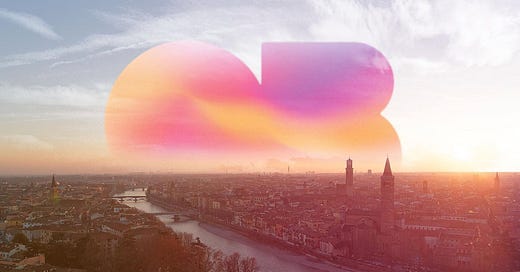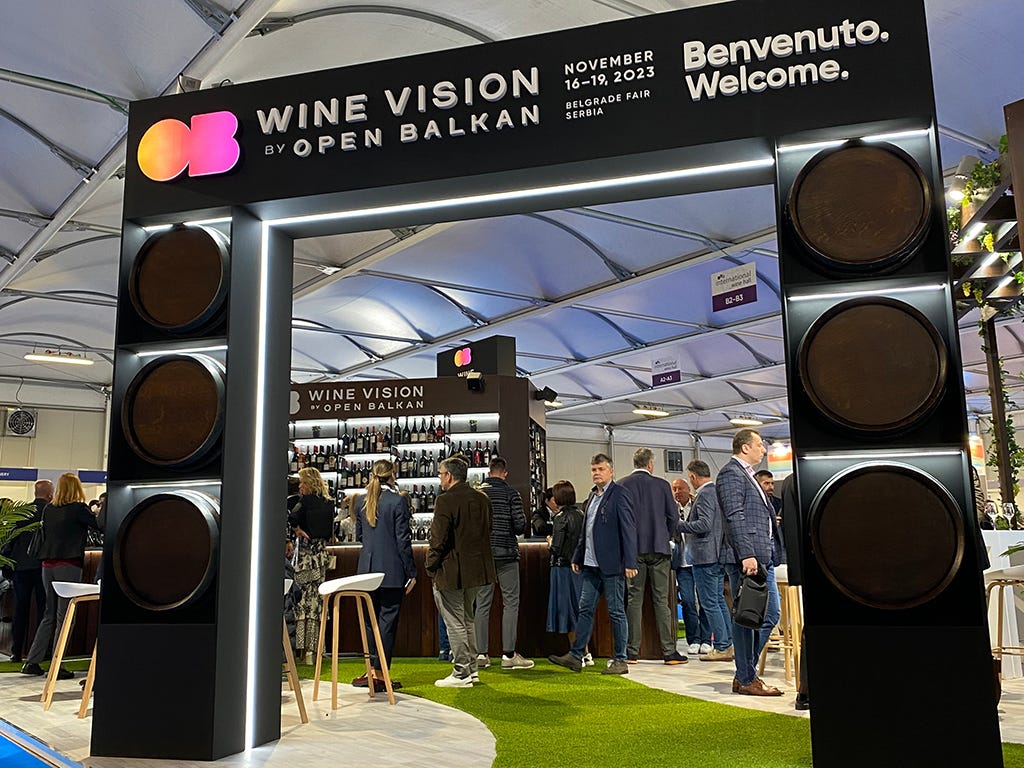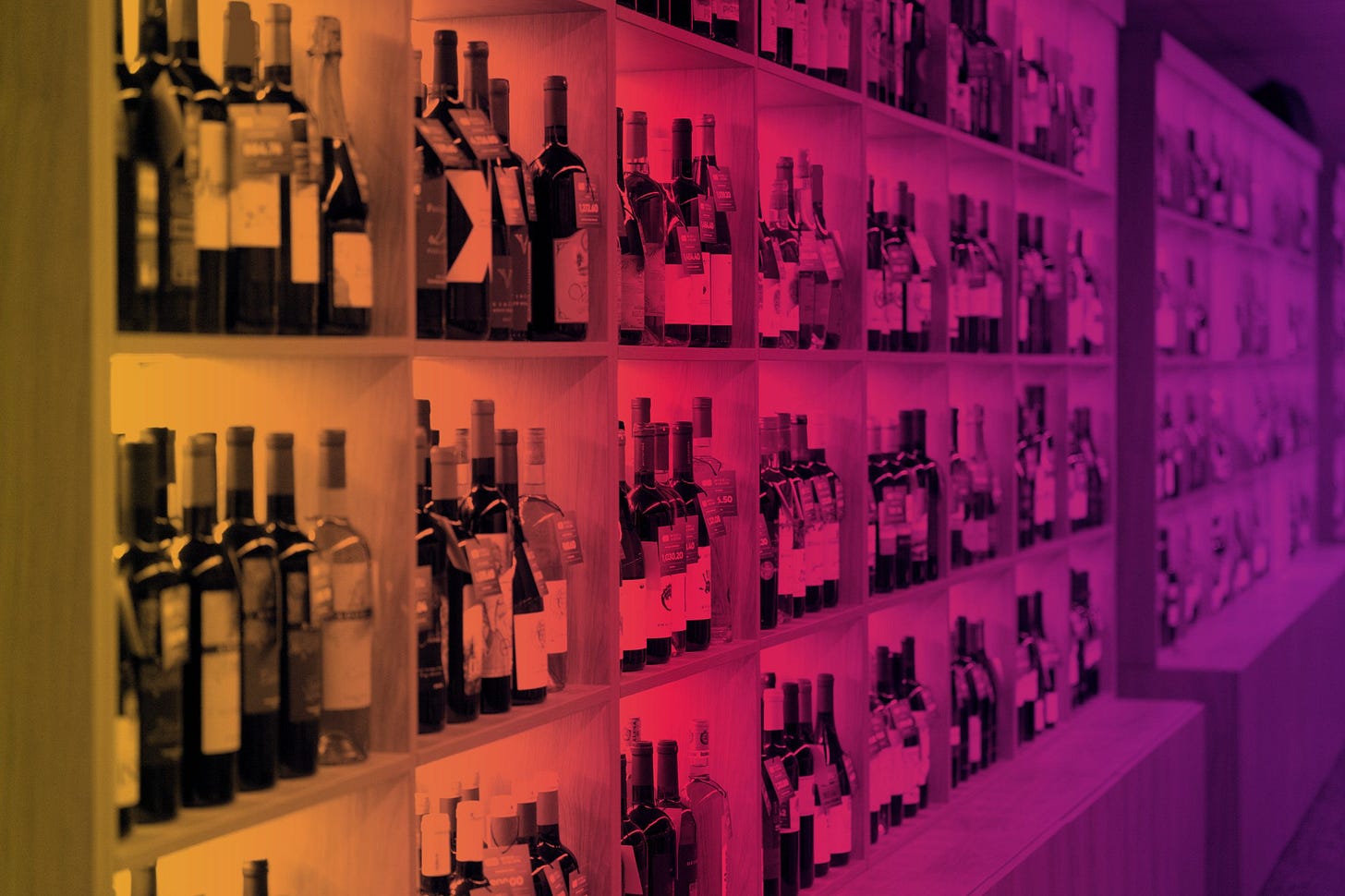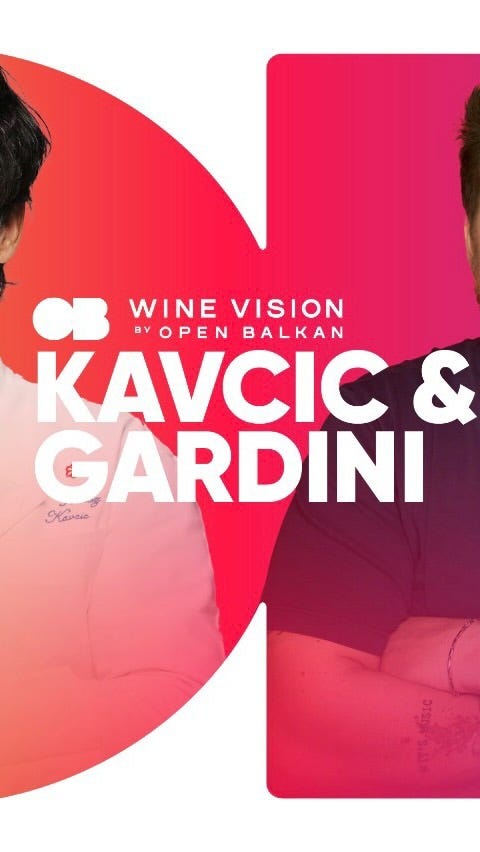S3E17. Fill the glass, Open Balkan(s)
The international wine exhibition Vinitaly hosted a group of more than 150 wineries from Albania, North Macedonia and Serbia. And an economic/political project in partnership with the European Union
Hi,
welcome back to BarBalkans, the newsletter (and website) with blurred boundaries.
Sometimes, weird things happen at our bar, the BarBalkans.
As we try to keep track, analyze and tell the Balkan reality, the reality itself can be more ‘barbalkanish’ than we might have thought.
Still do not believe it?
What about a political, economic and trade initiative to push the integration of the Western Balkans into the European Union, based precisely on promoting the Balkan wine excellence at the largest wine exhibition of the continent?
Wine Vision by Open Balkan project made its debut at Vinitaly 2023. It showed that we can learn more about the Balkan richness even through products like wine, as we do at the end of every BarBalkans’ newsletter.
From wine, from any specialty of the region, a broader reflection can start. About unity and cooperation, in every area of common living. In the Western Balkans and throughout Europe.
The Balkans at Vinitaly
Following the experience with the Slovenian orange wines in 2022, the latest edition of Vinitaly focused on deepening relations with a wine scene that has been attracting increasing attention from critics, entrepreneurs and consumers in recent years.
The doors of the international wine exhibition in Verona (Italy) have been opened to a group of more than 150 wines from Albania, North Macedonia and Serbia. The three Balkan countries united by the economic/political regional project ‘Open Balkan’, which has also been involving vineyards and wine glasses for the past year.
Wine Vision by Open Balkan - the food and wine exhibition organized for the first time in 2022 in Belgrade (Serbia) - was represented in Verona by a selection of the 150 best wines from the Western Balkans, more precisely from Albanian, Macedonian and Serbian vineyards.
After setting high standards for the dissemination of Western Balkan wine in the region, the time has come to push trade, diplomacy and international cooperation through wine specialties as well.
Read also: S2E31. Orange is the new white
«What comes from the Balkans is good wine. It is important to strengthen our cooperation through our identities and we want these countries to be part of the European Union», Italian Foreign Minister Antonio Tajani, one of the main promoters of the presence of Balkan producers at Vinitaly, explained.
The wine exhibition in Verona, one of the largest in the world, represents «a great event not only for Italian wine, but also for our friendly nations», that can build lasting relationships.
As demonstrated by the summit on Garda Lake on April 2, between Minister Tajani, Albanian Prime Minister, Edi Rama, Macedonian Prime Minister, Dimitar Kovacevski, and Serbian President, Aleksandar Vučić, focused on the promotion of the agri-food sector as a tool to support the regional economy.
There are «many opportunities for Italian companies in the Balkans, including in the wine sector». But this is also a strategy to stabilize the region, based on «economic growth and internationalization».
A boost to the Western Balkans’ path towards the EU membership and to the integration between the three members of ‘Open Balkan’ - Albania, North Macedonia and Serbia - and the three countries that are not yet part of it: Bosnia and Herzegovina, Kosovo and Montenegro.
«There is no reason not to join ‘Open Balkan’, together we are always stronger», Macedonian Prime Minister Kovacevski urged.
What is ‘Open Balkan’
What is this ‘Open Balkan’?
This is an economic and political cooperation project between Tirana, Skopje and Belgrade, born in 2019 and put into practice in 2023.
The aim is the creation of a free trade area based on the four guarantees of the Schengen area: free movement of people, goods, services and capital, with no more border controls between one country and another.
Plans for the creation of what was initially called ‘Mini-Schengen’ were drawn up in October 2019 in Novi Sad (Serbia), with two more preparatory meetings in the following months in Ohrid (North Macedonia) and Durrës (Albania).
The project officially came into being on July 29, 2021, while the agreements to strengthen regional cooperation and open national borders - with no restrictions to citizens and goods - has been signed on January 1, 2023.
While Kosovo initially agreed to join it, but has not followed up with concrete steps, Montenegro and Bosnia and Herzegovina currently are not interested, as they are more focused on the path towards the EU membership.
Read also: S2E10. The Western Balkan Union
However, the membership in both the organizations is not contradictory. Quite the opposite.
The EU institutions are pushing for the implementation of a free trade area in the Western Balkans, as it is considered the antechamber to the European Single Market. A sort of preparation for the standards that will be required of the new member countries, once they will complete their membership in the Union.
This is how the common market between Albania, North Macedonia and Serbia is considered in Brussels. Almost 12 million people will be able to cross borders with their own identity cards and exchange goods and capital freely with unified procedures.
A commercial union as well, as demonstrated by the group of wineries from the three Balkan countries at Vinitaly 2023.
If you pay attention, you can read a story of cooperation and integration even at the bottom of a bottle of wine.
Pit stop. Sittin’ at the BarBalkans
We have reached the end of this piece of road.
Wine Vision by Open Balkan brought not only exhibitors to Vinitaly 2023, but an entire food and wine experience about Balkan excellence.
The apex was reached with the masterclass Indegenous varieties of Balkan - Taste the difference, led by sommelier Luca Gardini and star chef Tomaz Kavćić. Nine labels for as many indigenous varieties of the Balkans, to discover the potential of wine regions that are more and more renowned on the international scene.
For the occasion our bar, the BarBalkans, welcomes Slovenian chef Kavćić. As Honorary Consul of Serbia in Slovenia, he has been collaborating in the development of Wine Vision by Open Balkan project since its inception.
Chef Kavćić, what is the value of this initiative?
«In my opinion, this is one of the most beautiful ideas that have emerged from our territory lately, the territory of former Yugoslavia. Being united, coming together and talking about peace: this is what we do, when we talk about food and wine.
But ‘Open Balkan’ and Wine Vision by Open Balkan are much more than this. I am Slovenian and, watching them from the outside, it is a joy to see these three countries working together. Together, we are stronger. Also by offering emotions and sharing moments to people through food and wine.
I hope that this idea will expand in the future throughout the Western Balkans, to the three countries that are not currently part of it. It would bring more strength, more visibility».
What about the promotion of Balkan wines?
«I followed the idea of Wine Vision by Open Balkan very closely and participated in the first edition in 2022 in Belgrade. I am sure it will become one of the most important exhibitions for gastronomy and wine in the region.
I invite guests and producers to participate in the 2023 edition, because it will be a great opportunity to promote food and wine from our territories.
The experience at Vinitaly was also important. I perceived a great desire and willingness from producers to exchange experiences and continue to improve their products. But also from consumers to learn more about Balkan excellence.
I really saw many surprised faces in Verona after tasting wines from these three Western Balkan countries».
Can you tell us a bit more about the masterclass? And what about the reaction of the expert audience?
«The sommeliers chose 3 wines for each country. So, I opted for 3 courses, one for each country. And then the final course dedicated to ‘Open Balkan’: the “three friends dish”, made of potatoes, eggs and truffle. Three ingredients that go very well together.
The masterclass was packed, there was no more space. We showed hospitality, pairing each wine with specific dishes. It was an interesting experience with so many emotions, like few others.
The audience was particularly pleased with white and red wines that are evolving in the right direction».
Which wines do you feel like recommending?
«It is really difficult to recommend just one wine. It depends a lot on the event, and there is one Balkan wine for every occasion: for special events, for everyday life, to be paired with specific dishes…
For example, for the “three friends dish” we decided to pair a 100% Prokupac by Čokot Winery, from Serbia».
The list of wines of the masterclass ‘Indigenous Balkan Varieties - Taste the Difference’
Albania
Nurellari Winery - Serina
Çobo Winery - E kuqja e Beratit
Çobo Winery - Shendevere
North Macedonia
Tikveš Winery - Barovo Crveno
Kamnik Winery - Terroir Grand Reserva Vranec
Cantina Stobi - Vranec Veritas
Serbia
Vinčić Winery - Grašac White Reserve
Čokot Winery - 100% Prokupac
Lastar Winery - Tamjanika
Let’s continue the BarBalkans journey. We will meet again in two weeks, for the 18th stop.
A big hug and have a good journey!
Your support is essential to realize all that you have read. And even more.
Because a job well done - always aiming to improve - needs many hours and energy, also to keep BarBalkans newsletter free for everyone.
An independent project like this cannot survive without the support of the readers. For this reason I kindly ask you to consider the possibility of donating:
Every second Wednesday of the month you will receive a monthly article-podcast on the Yugoslav Wars, to find out what was happening in the Balkans - right in that month - 30 years ago.
You can listen to the preview of BarBalkans - Podcast on Spreaker and Spotify.
Pay attention! The first time you will receive the newsletter, it may go to spam, or to “Promotions Tab”, if you use Gmail. Just move it to “Inbox” and, on the top of the e-mail, flag the specific option to receive the next ones there.








